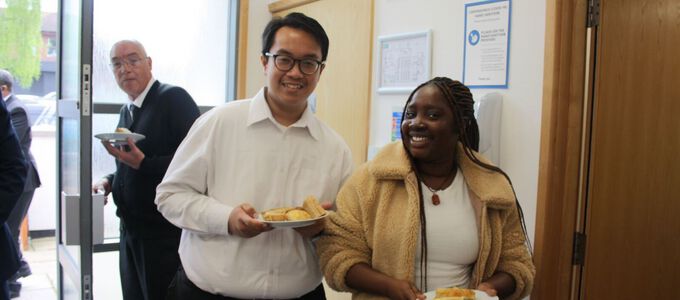
Far from home, but at home in faith: Afua Ampong moved abroad to study. England, her new home, is so different from where she has lived most of her life, Ghana. Fortunately, the members in the New Apostolic congregation opened their hearts and she has found a spiritual home.
It is 9.34 a.m. on a Sunday morning and the church doors in Birmingham are not open. Afua Ampong is confused. Did she get the service times wrong? It is cold, only 15 degrees Celsius. With cold fingers she taps away on her mobile phone to call someone. Fred Quansah- Haylse laughs when tells him why she is phoning. “The door is not locked, open it.” Because of the cold weather in England, the church doors are kept closed, but they are not locked.
Afua is not used to this from her home congregation of East Legon in Ghana. There, the doors are always wide open, whether the sun is shining, it is raining, or the harmattan—a dry wind—is blowing. This is not the only difference Afua has had to get used to in her new home.
The road abroad
Afua lived with her family in Ghana’s capital Accra, where she was a member of the East Legon congregation until about a year ago and was a Sunday School teacher. She studied political science at the University of Ghana from 2017 to 2021 and attended the campus congregation for the duration of her studies, where she was also very active. After her compulsory year working for the National Communication Authority of Ghana, she decided to study international relations at the University of Birmingham.
It was absolutely clear to Afua that she wanted to be active in the church in her new home. “I definitely wanted to go to church here,” the 26-year-old tells nac.today.
Something familiar in a strange place
Afua did not have to make a new beginning in Birmingham all alone. “I have relatives in Birmingham whom I visited from time to time” And her faith also gave her security. When she moved in with her relatives, she found that the church was less than a 20-minute walk away. She also knew someone from another congregation in Ghana who had moved to the United Kingdom: Fred Quansah- Haylse “His family has basically known me since I was born,” she says. “Before I came here I got in touch with him and it turned out he actually lives in Birmingham. It was really nice to see a familiar face here.”
“I was blown away by the brothers and sisters”
The first time, Afua went to church in Birmingham with no expectations at all. “And the brothers and sisters just blew me away,” she says with a smile. “The way I am treated in the congregation, the way we respect each other as family, that makes me always want to do my best.” She feels loved in the congregation. “They want me to be happy because they understand that I am far from home. That’s why they make sure I don’t feel sad or lonely.”
That is why she let herself be persuaded to sing in the choir, although she had never intended to do so. And she is involved in youth work and plans excursions. In the process, she has learned about one of the main differences between England and Ghana. “When I say in Ghana, ‘Next week I am planning this and this,’ then everyone will be there. Here in England I have to plan something months in advance to make sure everyone will have time that day.” Why is that? “For Africans, religion is part of our core, an integral part of society. It is something we grew up with.” In Europe, she has noticed, that faith has a different status. It is not such an important part of peoples’ lives.
Foreign yet familiar
Asked about the differences between Ghana and England, Afua says: “I think everything is different. In Birmingham it’s usually cold and in Ghana it is usually hot and sunny. The culture is different and how people relate to each other.” But one thing is the same, she says. “The way we love to go to church and worship together, it is the same in Ghana and England. There’s no difference.”
Of course, there are differences, for example in the size of the congregation, when to wear black and white, and calling the rector by his first name. Afua says she would never do that in Ghana. But the most important thing, faith, is the same both here in England as well as in Ghana.
Eating together
“One thing I miss about Ghana is the food,” Afua says. Waakye is a typical Ghanaian dish with rice and beans. “Recently I saw a video online of someone having that at home and I was like, I really miss that,” she says. She also misses her home congregation, especially the children whom she taught in Sunday School. “Teaching the children, learning from them, and interacting with them was one of the good experiences in my life.”
And then there are our Christmas parties. “On Christmas Day or a few days after we usually have a party outside the church. Just cook, eat, laugh, and drink.” She was therefore worried about being lonely on her first Christmas in England. But the rector of the Birmingham congregation and his family invited her and a few others from the congregation. He is South African, his wife French. Afua enjoyed the multicultural food and spending time with friends and his family.
“You have to make a conscious decision”
Birmingham is a multicultural congregation, and food is not the only tell-tale sign. People are constantly talking about how something is done in their home country. “It has taught us to respect one another and one another’s culture,” Afua says. “We understand that we are different people, but we have come together in one church and we believe in one God and we worship the one God together.”
Afua says she has learned to become independent and wants to live her life in England in a positive manner. Her faith and the members in her congregation have contributed to this. She has a tip for anyone who moves to a foreign country. “Surround yourself with people there who can help you grow in faith. Pray so that the Lord can direct you.” And aside from the conscious decision that one has to take, she says, “You yourself must want to live your life in this positive manner and work towards it.”


















